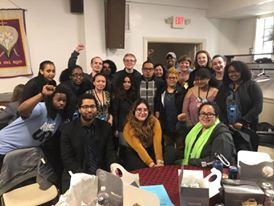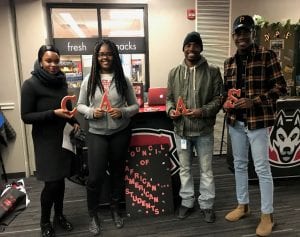
Internships in non-profit social justice organizations can be a powerful, challenging, and fulfilling experience for students from a diverse range of disciplines. My experience with Take Action MN taught me the skills I needed to build community and political power, building relationships with community members and organizations, and providing the necessary resources to the community to educate and build powerful leadership skills. This work is an especially powerful experience for sociology students that wish to address structural and systemic oppression through grassroots mobilization, community education, and local, state, and national policy-change. The environment of social justice work is framed by a culture that builds relationships through shared cultural values and aimed at creating structural change to challenge and dismantle systems of oppression fueled by neoliberal capitalism.
There is an expansive range of skills that sociology students can apply into the fieldwork and administrative work of organizations like Take Action Minnesota. Because the work consists of expanding the political and economic framework of Take Action, there are a plethora of opportunities for sociology students to create an impactful internship experience. I used my internship to critically analyze the internal structures of social justice work and organizations to gain insight into the creation and building of social movements, and in the process used that insight to reflect on my own experience and my stake in the movement for social justice.

Group Photo!
There were also plenty of opportunities for me to take on powerful roles and find ways to challenge and build myself. My team that I worked with were in the beginning stages of building a base of community members in St. Cloud when I reached out to them about my internship. As a result, I was given many opportunities to build relationships in the community, gain experience in the groundwork of movement-building, and, above all, build a legacy for myself in St. Cloud. I was propositioned to take on a role to powerfully ask attendees of the first St. Cloud Annual Meeting to become sustaining monthly contributing members of Take Action by expressing my stake in the work and telling my story, and as a result gained over $500 for the organization.

Protest at the capitol
I also had the opportunity to go to Washington DC to attend a national convention, be a part of a large direct action at the White House, and meet national leaders from around the country. Finally, I also took on the opportunity to lead a training on how to build powerful relationships in the community, one of the first and most important steps to building a movement.
For my final project, I compiled a guide for leaders to facilitate trainings on how to caucus using in-depth discussion and hands-on learning. This guide will be useful for leaders in Take Action MN to lead their own caucus trainings to build higher turnout in future caucuses throughout Minnesota, as well as for myself in my interest in connecting students in St. Cloud with their community and building a powerful grassroots student movement in St. Cloud. This guide will help students with an interest in politics build student turnout in the local caucus and take on a powerful role in building student leaders at St. Cloud State. For future interns with interests in social justice organizing, I highly recommend using your internship to help build a powerful student movement and build powerful student leaders so that you may create a legacy for yourself on your campus and in your community.
Sociology students also have an advantage in this work considering our theoretical focus on the historical structures of capitalism and oppression as well as individual, group, and societal behaviors, attitudes, and values. Social justice and community organizing needs people with background in this knowledge in order to build relationships and leaders in the community and build movements for social justice. Sociologists can use this knowledge to research strategies, tactics, and procedures used by social justice organizations to find creative new ways to build power and community. Research and analytical skills are also important in the movement for social justice, be it data entry and statistical analysis, analyzing attitudes, values, and opinions of community members through qualitative or quantitative research, and theorizing new ways to expand the framework of the social justice movement. Finally, this knowledge is also very powerful in understanding our own oppressions, our stake in the movement, and our internal barriers that keep us from becoming the people we see ourselves becoming. If nothing else, this experience is highly reflective and powerful in building ourselves in our careers with the skills we’ve been given.
The job of intern organizers at Take Action MN varies depending on your placement in the organization and what program you work for. The common responsibilities of all fieldworkers are to schedule and have one-to-one conversations with community members (about 3-5 per week), lead and attend leadership trainings, build relationships with and between community members and organizations, lead and prepare phonebanks, attend and participate in community meetings, lead and attend direct actions, and build issue-based campaigns around issues important to ourselves and the community. Take Action MN provides trainings for all of its leaders in how to build their skills in these responsibilities. For information on available internships and job postings, visit Take Action MN’s website below, or contact Take Action MN’s outreach coordinator at april@takeactionminnesota.org. You may also visit their staff directory to contact program managers directly if you are interested in organizing in a particular program. Take Action MN provides both paid and unpaid internships.
JOB POSTINGS for Take Action MN:
http://www.takeactionminnesota.org/about-us/job-postings/
UPDATE: 6/29/17 Mike got a job with Take Action MN on their outreach team in the Twin Cities.
UPDATE: 7/15/18 Mike got a job as a Shelter Advocate with Stepping Stones












